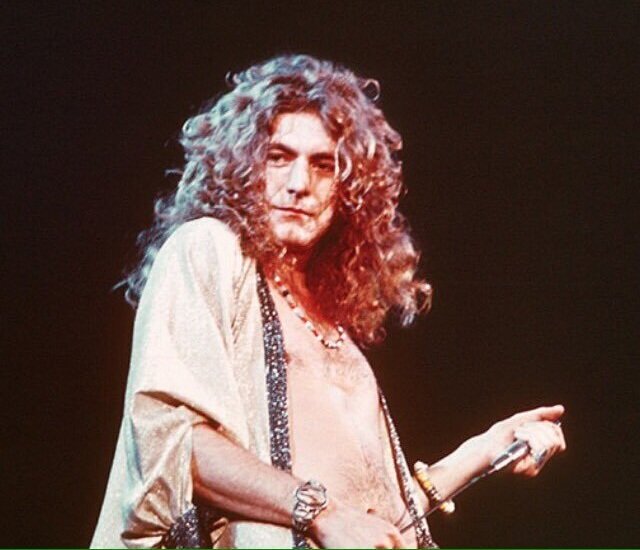REVIEW: Lana Del Rey's Norman Fucking Rockwell!
by Madalyn Whitaker
Young Robert Plant as inspiration for Del Rey
I’m lying on my living room floor watching as the first snow falls disappointingly early, coating the red and yellow trees outside. Lana Del Rey’s Norman Fucking Rockwell! spins on my turntable. I belt out all the lyrics that I’ve come to know in the months since the release into my sadly furnished apartment, ignoring that I’m off pitch and probably driving my neighbors absolutely insane considering this is the third time I have listened to this particular album today. Del Rey has transcended her summertime sadness. Norman Fucking Rockwell! is about unapologetically not giving a fuck. This album places the listener right into the flawed aesthetic of a California dream. Del Rey forces her listeners to look inside of her world through a haze of psychedelic synth. She moves past the R&B/pop influences of her past albums and indulges in the soft rock of the 70s that she is so fond of. It’s hard not to imagine her as the next in line for Led Zeppelin frontman Robert Plant’s throne.
The first song on the album, “Norman Fucking Rockwell,” is a call out to every boy that thinks he is better than everyone else because he writes poetry and loves Quentin Tarentino, and who Del Rey is not afraid to openly fall for. You act like a kid even though you stand six foot two/Self-loathing poet, resident Laurel Canyon know-it-all... Why wait for the best when I could have you? Del Rey also uses this song to paint her listeners into the blue world that loving someone who is so self loathing creates.
Del Rey’s second single from the album is “Venice Bitch.” During an interview with BBC’s Beat Radio 1 she says “It was funny when I played for my managers. I was like ‘yeah, I think this is the single I wanna put out,’ and they were like ‘it’s 10 minutes long, are you kidding me. It’s called ‘Venice Bitch,’ like why would you do this to us? Can you make like a 3-minute normal pop song’ and I was like ‘no, end of summer, some people just wanna drive around for 10 minutes and get lost in electric guitar.’" And she was so right. Everything about this single screams end-of-summer nostalgia from kissing under the bang of fireworks, to the golden sunlight of the day fading away, trying to make the relationship work past the easy loving days of summer. Then, Lana loses herself in a five minute psychedelic synth and electric guitar solo and she takes her listeners with her. High, floating lyrics weave in and out of the ongoing solo, forcing us to trip with her. She ends on the repetition of if you weren’t mine/I’d be jealous of your love, while that psychedelic guitar wraps around her smooth voice, leaving us in the nostalgia of a summer anyone who’s “American made” can remember.
“Fuck it I love you,” is a sexy electric guitar ballad with a haunting, dissonat chorus. Her voice floats effortlessly through the rapid lyrics and slows down with the tremolo guitar by the end of the verse. The song ends with a dreamy synth and we move right into the next song “Doin’ Time,” which is a cover of Sublime’s song by the same name. “Love song” is the most Lana Del Rey song on the album, sounding like something from her 2012 album, Born to Die. “Love song” is a slow, lustful piano ballad with very subtle strings in the background.
“The Next Best American Record” diverges from the earthy, beachy, California aesthetic the previous tracks put us in, and we move back to this idea of achieving a lavish lifestyle that Lana has loved to write about in her past records.
Cover art for Norman Fucking Rockwell
“Bartender” puts the listener into an indie movie, driving through the canyons of Orange County, CA in an old pickup truck, to some dive bar on the beach just to fall in love with the bartender. The piano underneath Del Rey’s vocals creates a longing for this quiet romance, one that she has to sneak to, just to keep the love alive.
The album ends on a slow, soft ballad called “hope is a dangerous thing for a woman like me to have - but i have it.” The song features just Del Rey’s vocals and a sparse but powerful piano in the background. This song is all about the lyrics. She references Sylvia Plath, one of Del Rey’s biggest lyrical influences, many times throughout the song. She has been quoted saying this song is incredibly personal for her, it has no meaning to anyone outside of herself. It’s a powerful solemn note to end an incredibly vibrant record on.
Norman Fucking Rockwell! moves Del Rey’s sound into a new direction, divulging from the pop/R&B records of her past and into her own interpretation of 70s rock, reminiscent of Led Zeppelin, the Mamas & the Papas, and the Commodores. Del Rey’s powerful lyrics and nostalgic vocals leave her listeners longing for a summer they never had. One spent in California, driving through those famous canyons just to reach the Pacific Coast Highway and cruise along those beautiful, rocky beaches. As the neon green record crackles, reaching a static stop, I look out my window once again and really wish it wasn’t snowing in November.



